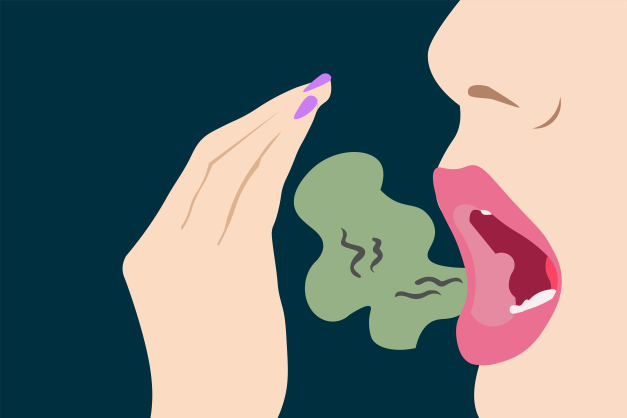By Dr. Valerie Anithra Pereira
Have you ever been in a situation where you are sitting in a movie theatre and someone leans over to whisper something? Bam! You are hit with a bomb of stink from their mouth worse than the garbage truck! Or the overbearing relative leans in to kiss your cheek only to overpower you with the noxious gases emanating from their gob. Quite a situation isn’t it? Do you know what could be worse though? If YOU were the person all your friends and relatives were hiding from in fear of the malodour that they perceived to be worse than the Dementor’s kiss.
Halitosis, which is nothing but mouth odour or bad breath, is a very common affliction and affects more than 50% of the population.
What causes Halitosis?
Halitosis has multifactorial causes but 90% of the causes are from the oral cavity- the most prominent being poor oral hygiene and food lodgement. This leads to the growth of microorganisms which results in periodontal disease and dental caries. Other causes are tongue coating, oral carcinomas, and throat infections. Ill-fitting dentures and faulty restorations also result in an unpleasant odour. The Halitosis-causing bacteria use proteins as a source of nutrition and degrade them to produce volatile sulphur compounds and other odoriferous compounds which cause the bad smell.
9% of the causes are due to systemic causes like diseases of the respiratory tract, gastrointestinal tract, diseases of the liver, kidneys, urinary tract, or diabetic ketoacidosis. These are characterized by a peculiar type of odour like mousy, sweetish, fishy, acetone, uremic, putrefactive, fetid, or fruity depending on the cause.
- 1% is due to diet and drugs.
- Physiological Halitosis, which is normal, is due to eating foods like garlic or morning breath due to decreased salivary flow at night when one sleeps.
- Smoking, menstruation, and alcohol also cause mouth odour.
- Disorders like depression or psychosis may also cause Halitosis.
Diagnosis
Most important for the treatment of halitosis is the detection and determination of the source by clinical examination by a dentist. Once the cause is established the dentist may do the needful procedures to remove the etiology. The dentist may also be the one who detects the systemic cause and refers for a consultation to the physician.
Pseudohalitosis is a condition where the patient complains of Halitosis which is not perceived by others and this needs a referral to a clinical psychologist.
Treatment
- Treatment at the dental clinic will include simple measures such as scaling and root planing, instructions for oral hygiene, tongue cleaning, and mouth rinsing.
- Chewing gum and mints, mouth rinses and sprays decrease the odour. However, these are just ways to mask the odour with fragrance. These approaches should be only used as temporary measures.
- Professional identification of the etiology and treatment of Halitosis is necessary.
So do visit the Dentist if you have Halitosis; lest you become the foul-breathing dragon people run away in fear from.
About the Author:
Dr. Valerie Anithra Pereira is a consultant dentist who specialises in Peridontics (gums). She completed her BDS from AJ Institute of Dental Sciences, Mangalore. She then practiced at Narayana Hrudayalaya in Bangalore before going on to do her Masters in Periodontics and Implantology at Rajiv Gandhi University of Health Sciences in Coorg. She has worked as an Assistant Professor in Periodontology at Bhopal University and Maharashtra University of Health Sciences, Nashik She is available for consultation in Panjim. She can be contacted via WhatsApp on: 8208007184.


